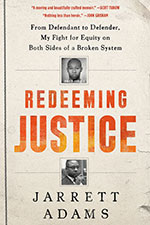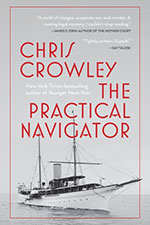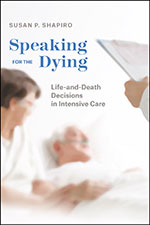 VERDICT: Touchdown!
VERDICT: Touchdown!
Redeeming Justice
By Jarrett Adams (New York, NY: Convergent Books/Random House, 2021). 292 pgs. $22.99. Order, www.amazon.com.
Reviewed by Amy Klemm Verbos
Redeeming Justice by Jarrett Adams is a compelling, essential book that should be required reading for every Wisconsin judge, prosecutor, defense attorney, lawyer, and resident. Adams’ memoir is a wake-up call and cautionary tale to everyone involved in the justice system. I began reading with some skepticism but finished this book haunted by Adams’ poor treatment at every stage in the process. Adams was dehumanized by police officers, the prosecutor, the judge, jurors, prison guards and administrators, state appellate courts, and the federal district court. So many questions came to mind. Why doesn’t innocence matter in Wisconsin? How is justice best served? Perhaps more important, what can we do to create an imperative to correct injustice? Why isn’t the entire justice system engaged in fixing what is broken rather than maintaining the status quo?
It should have been clear from the beginning that the three teenagers (Adams and two other people) did not commit a crime and should not have been charged. The police officer withheld exculpatory evidence that should have ended the matter without a referral to the prosecutor. The prosecutor should have declined to prosecute. Why didn’t he investigate and dismiss the charges? The preliminary hearing judge admonished the prosecutor to “fill in the gaps” in the case, strongly suggesting that probable cause was on very shaky ground. Why did the trial judge allow the prosecutor to cast the defendants as “scary black men” to cover for an inconsistent and ultimately wrong case? How could a judge so cavalierly sentence teenagers to 20-year and 28-year prison terms? Why tack on eight years for something that had no bearing on culpability and without even a discussion? When the third man ultimately demonstrated his innocence (and that of the other two men), how could the convictions of the other two young men stand for years and years?
Jarrett Adams’ experience would be the stuff of a horror novel if it weren’t true. Adams’ strength of character, perseverance, and humanity shine throughout his story. An innocent teenager, thrown away by a broken system, Adams has survived, damaged but not destroyed by this nightmare experience. By the grace of God, he found helpers on his way to justice and became a lawyer after he was exonerated. Jarrett Adams will inspire you, move you, compel you to face very ugly truths. Racism is a cancer in our justice system. Justice dies when we fail to treat the “other” as human. We can and we must do better.
A first step is to read Adams’ book. The next step is in your hands. What will you do to redeem justice? This is a question that begs to be addressed and not only by the University of Wisconsin Law School’s Innocence Project.
Amy Klemm Verbos, U.W. 1984, Ph.D. (management science) U.W.-Milwaukee 2009, practiced corporate, banking, and real estate law for 17 years before becoming a management professor. She is retired from her position as associate professor of business law at U.W.-Whitewater.
 VERDICT: Not for Me, Maybe for You
VERDICT: Not for Me, Maybe for You
The Practical Navigator
By Chris Crowley (Denver, CO: Sopris Books Ltd., 2021). Novel. 391 pgs. $16.95. Order, www.amazon.com.
Reviewed by Amy Klemm Verbos
I love a good murder mystery steeped in law, but, ultimately, The Practical Navigator misses its mark. Author Chris Crowley, formerly a litigation partner at New York’s Davis Polk & Wardwell LLP, opens the book well. In July 1988, in the aptly named Broken Harbor, Harry Bigelow commits suicide by pistol, off the side of his sailboat, after being charged with murder and suffering public disgrace. New York lawyer Timothy Bigelow, Harry’s beloved and adoring younger brother, narrates this sordid tale. Tim Bigelow is mostly a likeable character, as is Harry. Harry dubbed Tim the “practical navigator” for navigating his life and the law within the rules. The story is rich with human frailty and failings as well as love, loyalty, and fiddling with the law.
Want to Review a Book?
Please request a book and writing guidelines from Wisconsin Lawyer managing editor Karlé Lester, at klester@wisbar.org or (608) 250-6127. Reviewers may keep the book reviewed. Reviews of about 500 words are due within 45 days of receiving the book. Reviews are published, space permitting, in the order received and may be edited for length and clarity.
Crowley reaches for meaning by referencing literary critics of the early 20th century and Greek mythology, but the references don’t work well. The Arcadia Yacht Club of New York, Boston, and Mount Desert, built by rich men with old money, is being usurped by George Minot. Minot, the murder victim, chose his name and mystique as a minotaur (a mythical creature with the head of a bull and the body of a man). He embodies a minotaur through sexual debauchery and an overbearing alpha-male persona. Tim’s love interest, Cassandra “Cassie” Sears, supposedly understands some future events. Her name is obvious, and Crowley redundantly explains that in Greek mythology, Cassandra knew the future but was cursed so no one believed her. Tim does not believe Cassie, but readers expect that she is foreshadowing events, even if the “why” Tim will do what he does is revealed later. [Avoiding any plot spoilers here.]
There are many murder suspects, including Harry. To some extent, this is part of the problem with this novel. Too many people supposedly are caught up in Minot’s sex and drugs labyrinth, purportedly explained by “the times” in which the story is set. This is not believable, at least not to me, and I was a young corporate lawyer at the time, albeit not in New York. Minot, the amoral businessman, is believable. Stock shenanigans in a takeover? Very 1980s. Drugs, especially cocaine, as a scourge among rich people at that time? Sure. But a casual sexual predatory couple with an irresistible pull? That is where Crowley lost me. Completely. I can usually suspend disbelief to go where a storyteller wishes to take me. Perhaps the “ick” factor is too strong.
Another major failing in this novel is dialogue. It is often stilted and superficial. Tim and other characters undertook legal (and illegal) maneuvers that do not stand up to scrutiny. A 1988 setting makes Crowley strain credulity to make some key technological aspects fit. I cannot recommend The Practical Navigator; in too many ways, it just does not ring true.
Amy Klemm Verbos, U.W. 1984, Ph.D. (management science) U.W.-Milwaukee 2009, practiced corporate, banking, and real estate law for 17 years before becoming a management professor. She is retired from her position as associate professor of business law at U.W.-Whitewater.
 VERDICT: Touchdown!
VERDICT: Touchdown!
Speaking for the Dying: Life-and-Death Decisions in Intensive Care
By Susan P. Shapiro (Chicago, IL: Univ. of Chicago Press, 2019). 336 pgs. $30. Order, www.amazon.com.
Reviewed by Amanda Pirt Meyer
The author of Speaking for the Dying, Susan Shapiro, is a sociologist and research professor at the American Bar Foundation. Her ability to conduct detailed and exhaustive research in a clinical setting, and present that research, is incredibly valuable, and the book is very well written. The book begins with an explanation of a clinical (hospital) setting and describes staffing of a typical intensive care department, its daily operations, and how it differs from other care departments. The illustration of the environment is both interesting and necessary because this environment functions as a silent party in life-and-death decisions.
Attorneys who practice in elder, disability, or health law can use this book to:
Undertake necessary updates to documents for end-of-life and healthcare decision-making;
Read modern concrete scenarios that illustrate the need for end-of-life planning, agent powers, and pre-illness communications with designated agents;
Learn about how modern healthcare inpatient facilities use end-of-life designations and related documents; and
Develop criteria or procedures regarding agent designations and education.
This is not an exhaustive list, but suffice to say that the book may yield both professional and personal rewards. In general, it may supply a necessary sense of urgency to polish your legal practice; most important, it might encourage you to establish or update your agent designations, long-term health plans, estate planning, and financial planning.
The author takes significant care to detail how a diverse set of individuals, “actors,” react to decision-making duties within the traumatic, distressing, high-pressure scenarios of a busy clinical setting. The personal and private nature of the evaluative process of agents provides opportunity to learn more about the human condition in these traumatic conditions, and the author also documents the notable effects that family members and friends have on the designated agent and their decisions. She additionally recognizes cultural and religious influences within scenarios. Readers are provided ample opportunity to consider “decision-making scripts” and create their own; the author similarly includes improvisations.
I both enjoyed and was suitably concerned in reading the author’s detailed observations of the perils of substitute decision-making, the fluidity of capacity and its effects on decision-making, and the applicable legal and medical ethics. It is abundantly clear that regardless of the detail of careful planning and diligence involved in agent designations and education, we should be professionally and personally aware that no plan is ever perfect (though we try). Planning must include discussion (and prompts for future discussion) to provide agents better knowledge and understanding of how they may step into decision-making roles.
Amanda Pirt Meyer, Marquette 2011, is with Haskins Short & Brindley LLC, Monona, focusing on Social Security disability law, guardianships, estate planning, probate law, elder law issues, and special needs trusts, and is a Veterans Administration-certified attorney. Pirt is an author of Mental Health Law in Wisconsin: A Guide for Legal and Healthcare Professionals (State Bar of Wis., 2021). She is a member of the National Organization of Social Security Representatives, the Wisconsin chapter of the National Academy of Elder Law Attorneys (chapter ambassador), the Dane County Bar Association (past board member), and the National Alliance on Mental Illness (NAMI) Dane County (board president). Pirt is a frequent presenter to professionals and community groups.
